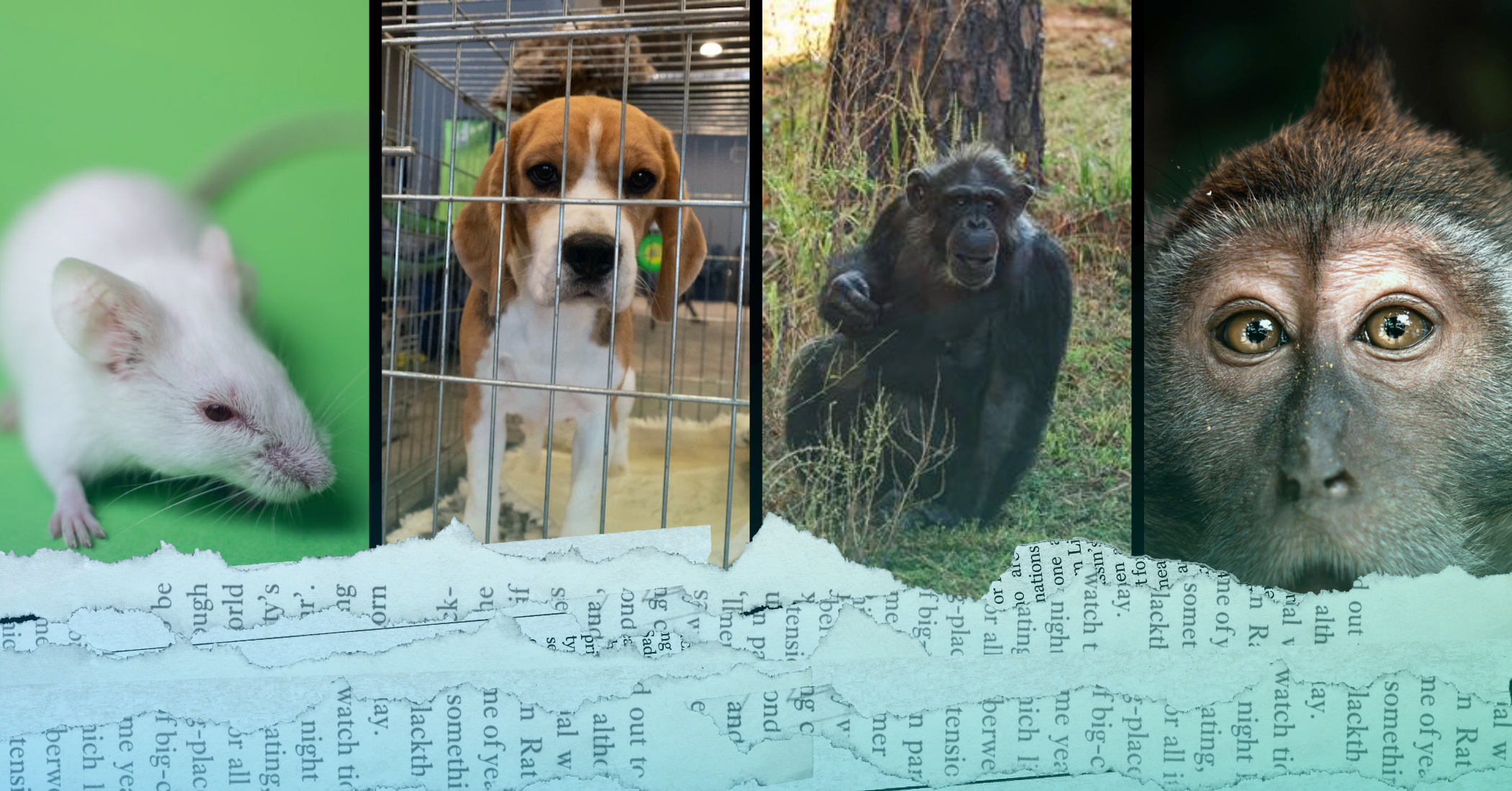
Here’s a roundup of the week’s biggest news stories related to animal research — all the recent media coverage you need to know right now to be the most effective activist for animals in labs.
 YOU’RE INVITED:
YOU’RE INVITED:
Ridglan Farms: The Path Toward Accountability and Change
On Nov. 19 at 7pm CT, join Rise for Animals, The Marty Project, and The Beagle Alliance for a free virtual event to explore the fight for justice at Ridglan Farms and learn how collaboration across science, law, and advocacy is driving systemic change for animals. 🗓️ Register to Attend →
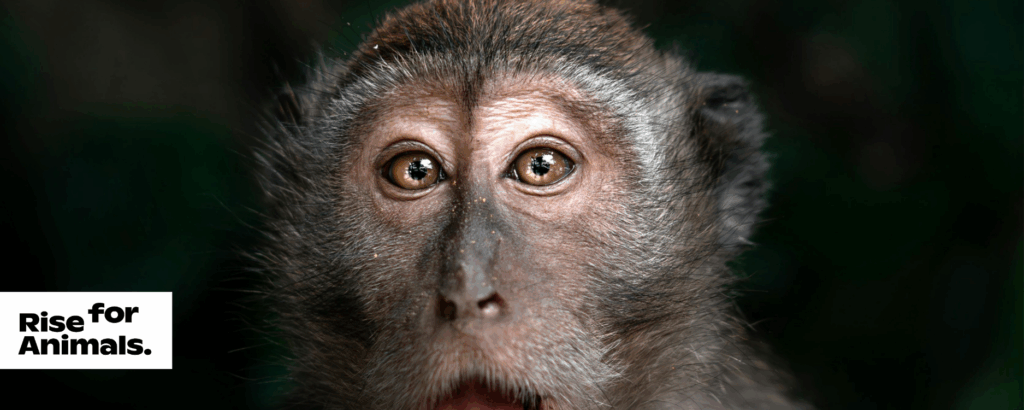 Is “Project Liberty” the Pinnacle of Industry Gaslighting?
Is “Project Liberty” the Pinnacle of Industry Gaslighting?
Rise for Animals, 11/10/2025
The animal research industry doesn’t just harm animals—it gaslights the public. It calls captivity “humane” and exploitation “science.”
And now, it calls the imprisonment of 30,000 monkeys in Georgia… “Project Liberty.”
Learn how this Orwellian lie is being sold to the public—and who’s behind it: 📰 Full Story →
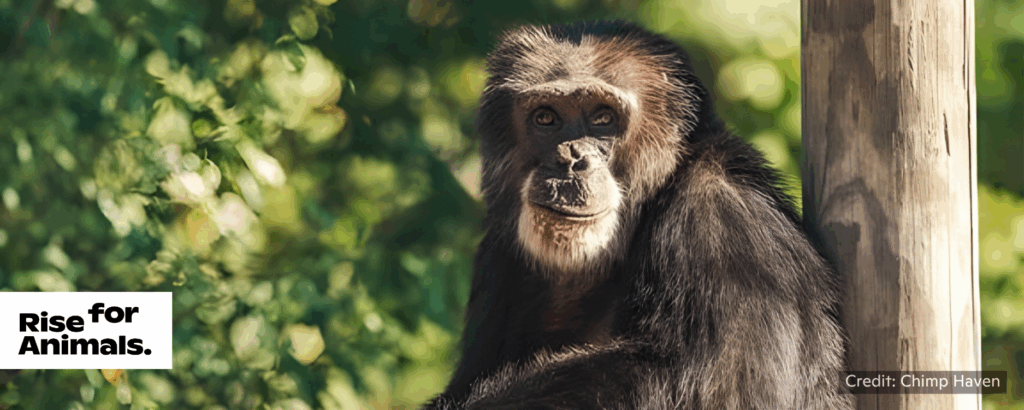 It’s Friendship & Fresh Air for Freed Chimps
It’s Friendship & Fresh Air for Freed Chimps
Rise for Animals, 11/13/2025
Thanks to your support, dozens of former “laboratory chimpanzees” are now living the lives they’ve always deserved at Chimp Haven, the world’s largest chimpanzee sanctuary.
The cooler autumn weather has arrived in Louisiana, and the sanctuary is alive with activity. The chimpanzees are spending extra time outdoors, exploring their habitats as the leaves begin to change. Among them are the Alamogordo chimps, survivors of decades in research who are now experiencing safety and community in their golden years. 📰 Full Story →
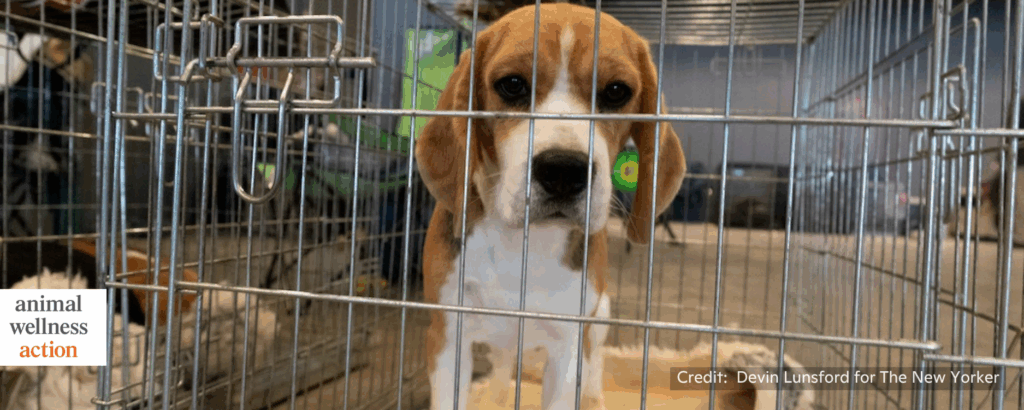 Stop Funding Beagle Tests, Says Coalition to NIH Leaders
Stop Funding Beagle Tests, Says Coalition to NIH Leaders
Animal Wellness Action & Center for a Humane Economy, 11/6/2025
“Animal Wellness Action, the Center for a Humane Economy, [PETA], Rise for Animals, and other advocacy groups are urging the National Institutes of Health (NIH) and the U.S. Food and Drug Administration (FDA) to suspend all use of federal funds to procure beagles from Ridglan Farms, a Wisconsin-based commercial dog breeder repeatedly cited for animal cruelty, and to deny funding to any grantee using beagles in its testing regimen.”
“‘Every dollar the NIH spends at Ridglan Farms bankrolls a system built on animal suffering,’ said Ed Butler, executive director at Rise for Animals. ‘Ridglan isn’t a rogue breeder. It’s part of a taxpayer-funded pipeline that packs dogs into crates, ships them to labs, and pays for their mutilation under the guise of research. The NIH’s own policies promise a future beyond animal experimentation—one grounded in modern, human-relevant science—but that future will never come while it keeps paying for cruelty.’” 📰 Full Story →
 Opinion: My beagle spent years in a laboratory. Has testing on dogs finally had its day?
Opinion: My beagle spent years in a laboratory. Has testing on dogs finally had its day?
Melanie D.G. Kaplan, USA Today, 10/31/2025
“We’ve come a long way from 17th century surgical experiments on dogs, when scientists saw animals as unfeeling machines. Today, we know dogs feel pain, stress and loneliness. With modern technology, we can move toward science that’s more humane and more effective – and finally leave dog research behind.”
“Dog cognition expert Alexandra Horowitz told me that ‘everybody feels in their stomach’ you shouldn’t test drugs and chemicals on humans, and she feels that you shouldn’t do those things to animals, either. She said it’s bad for any animal, but for dogs, ‘who we’ve domesticated to be easygoing, it’s a horrible betrayal.’”
“As we better understand animals’ sentience – their ability to experience pleasure, pain, fear and joy – we’ve become less tolerant of keeping animals in poor conditions. Across party lines, people don’t want to see that dogs are suffering or treated like commodities.” 📰 Full Story →
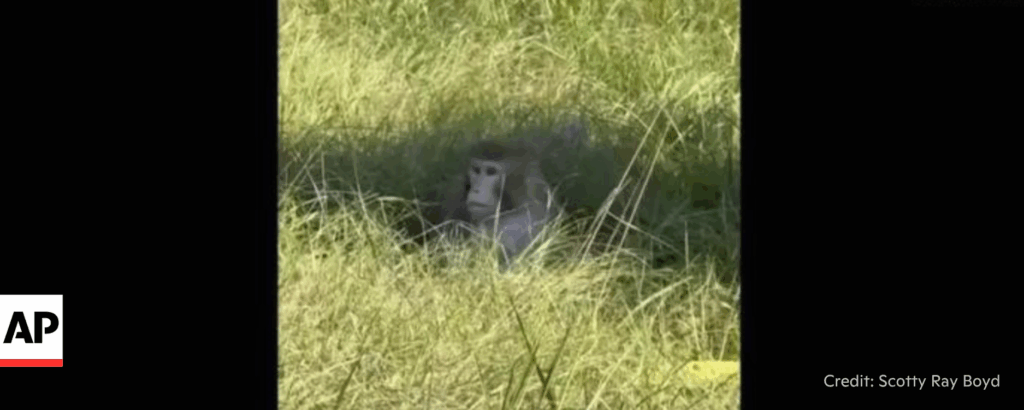 The last monkey on the loose among several that escaped after a Mississippi highway crash has been found and captured
The last monkey on the loose among several that escaped after a Mississippi highway crash has been found and captured
Scotty Ray Boyd, Associated Press, 11/7/2025
“The last monkey on the loose among several that escaped after a Mississippi highway crash has been found and captured, authorities said . . . Two other monkeys that eluded officers at the crash site were later shot and killed by civilians….”
“The escape is the latest glimpse into the secretive industry of animal research and how contracts demanding confidentiality prevent the public from knowing key facts about studies involving animals.” 📰 Full Story →
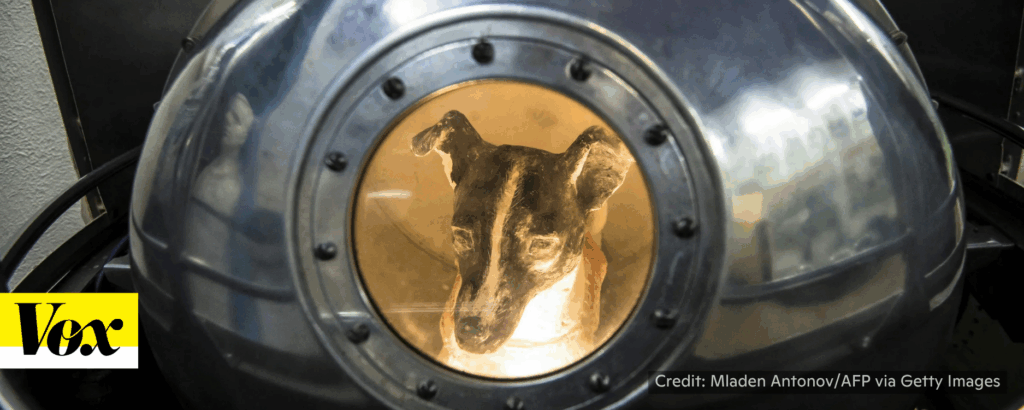 The tragedy of Laika, the first animal to orbit the earth
The tragedy of Laika, the first animal to orbit the earth
Shayna Korol, VOX, 11/8/2025
“ . . . on November 3, 1957 — 68 years ago this week — Soviet researchers launched the real Laika, a small black-and-white terrier mix, into space aboard the Sputnik 2 spacecraft, where she became the first living thing to orbit the earth, proving that life could survive both launch and outer space conditions for extended periods of time. But the technology that would facilitate her safe re-entry did not exist yet, so there was never any hope that she would come back alive.”
“The scientists intended for her to die painlessly after eating poisoned food after a week in orbit, but that’s not how the story turned out. Soviet physicians had implanted sensors into Laika’s body before her doomed flight to track her vital signs while she was in space. During the launch, her breathing rate quadrupled and her heart rate tripled. She reached orbit alive, alone, and terrified, peering out through the window at the planet far below. But then the life support capsule in her spacecraft malfunctioned, causing temperatures in the cramped cabin to spike to 104 degrees Fahrenheit. Somewhere between five and seven hours after launch, Laika died of hyperthermia and stress — overheating and panic. She had no way to understand what was happening to her.”
“ . . . little is said about what spaceflight was like for Laika and the many other animals sent to their deaths for space research. None of them understood what space was, nor did they have any choice in making the ultimate sacrifice for expanding humanity’s knowledge of the cosmos. Humans no longer send dogs and non-human primates to space — why would we, when we have willing human astronauts? — but animal experimentation in space research continues.” 📰 Full Story →
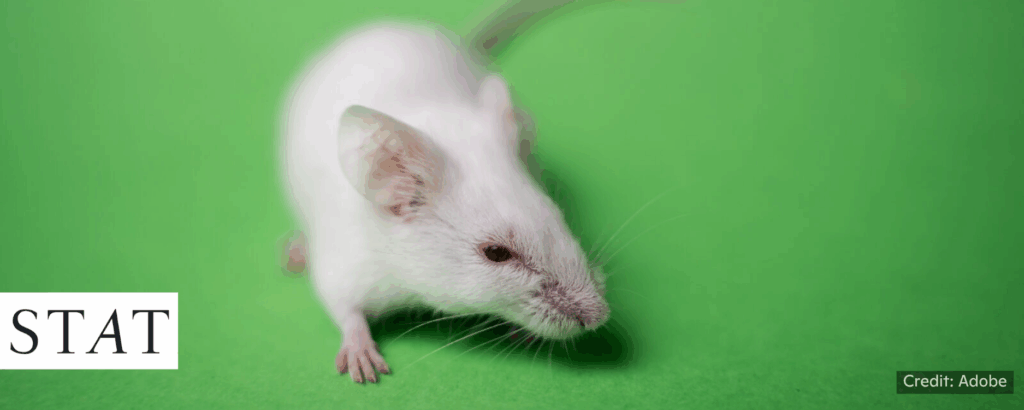 U.K. releases plan to phase out animal testing in research
U.K. releases plan to phase out animal testing in research
Andrew Joseph, STAT, 11/10/2025
“The U.K. on Tuesday outlined its plan to expedite the phasing out of animal testing in research, reflecting the push by a number of countries, including the U.S., to move beyond animal experiments even as some scientists stress the continued importance of such work. Under the government’s plan, issued by Science Minister Patrick Vallance, certain kinds of experiments will be halted within the next two years, and the use of dogs and monkeys in tests of human medicines will be reduced by 2030.”
“Specifically, the government’s plan calls for the end of a type of animal test used to assess whether a new treatment could cause skin or eye irritation by the end of 2026. The following year, scientists will be expected to move tests for detecting viruses and bacteria that can contaminate medicines to DNA-based methods.”
“Government officials have acknowledged they don’t envision a complete elimination of animal research any time soon, but the new policy is an effort to push forward on the progress toward reducing the use of animals.” 📰 Full Story →
 PETA challenges TWU project’s use of rats in blueberry research
PETA challenges TWU project’s use of rats in blueberry research
Lucinda Breeding-Gonzales, Dento Record-Chronicle, 11/11/2025
“[PETA], a global animal rights organization, recently criticized Texas Woman’s University for a past research project involving rats. PETA officials said the U.S. Highbush Blueberry Council funded a study published this year that subjected rats to unnecessary suffering. In a letter to the university’s nutrition and food sciences department, PETA described a research project in which researchers injected a chemical into the knee joints of rats to induce osteoarthritis, a painful condition in humans, and then fed them blueberries. The letter said researchers then starved the rats, drew blood samples, then killed them by severing arteries. Researchers then dissected the knee joints of the rats, the letter said.”
“TWU officials didn’t directly answer questions about the research and the treatment of the research animals but said the project ended in 2022.” 📰 Full Story →
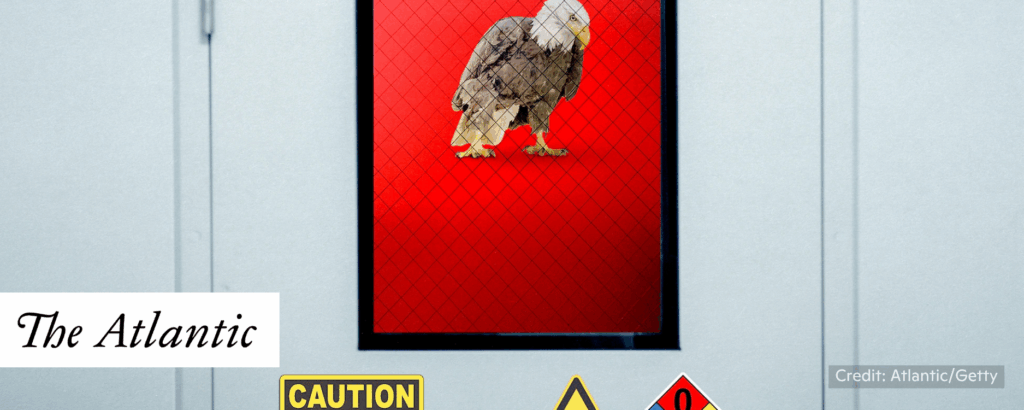 Trump’s Animal-Research Plan Has a Missing Step
Trump’s Animal-Research Plan Has a Missing Step
Melanie D. G. Kaplan, The Atlantic, 11/13/2025
“This year, the White House has broadcast its intent to greatly reduce animal experimentation in the United States . . . These initiatives, if they come to fruition, could prove quite popular. A recent Gallup poll shows that the proportion of Americans who approve of medical testing on animals has been dropping for decades. But it will be difficult for voters—and the administration—to understand the actual effects of the government’s efforts, because no one is tracking the total number of animals used across U.S. labs.”
“This system could allow the Trump administration to talk a big game about animal testing without enacting policies that force labs to meaningfully change their practices. Thus far, the White House hasn’t publicly proposed any changes to federal policy for tracking research animals . . . An FDA spokesperson told me that the agency’s regulatory mission ‘does not include counting, reporting, and publicly sharing numbers of animal usage in the United States.’”
“Perhaps one day, technological advances will make animal models obsolete; lately, the White House has been promoting AI’s potential to replace some animal testing. But in the meantime, Americans’ ability to gauge progress toward that goal will be limited. For a problem to be managed, it must first be reliably and transparently measured. Scientists understand that best of all.” 📰 Full Story →
Share this news compilation on X or Bluesky.
Or copy, paste, and share this link on Facebook or anywhere else:
riseforanimals.org/news/news-nov-14-2025